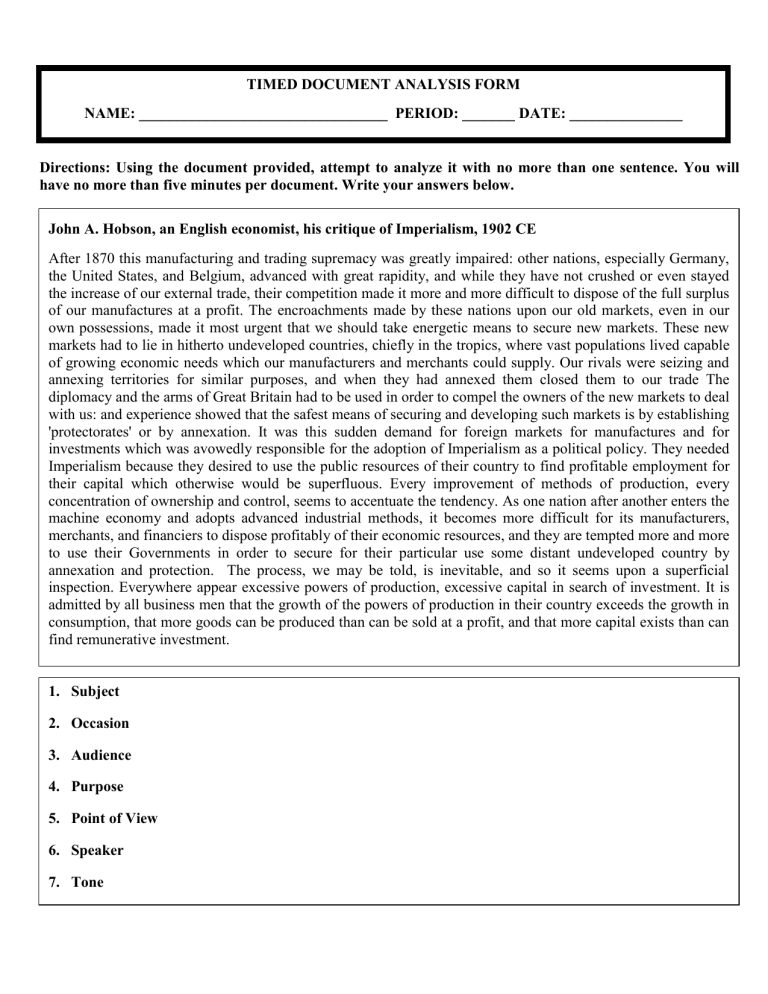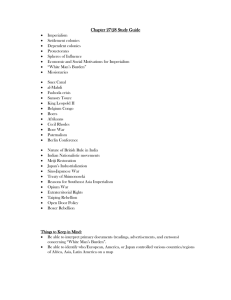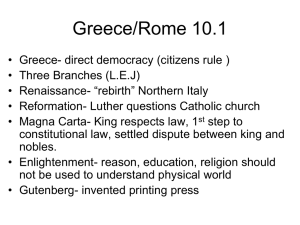TIMED DOCUMENT ANALYSIS FORM NAME: _________________________________ PERIOD: _______ DATE: _______________
advertisement

TIMED DOCUMENT ANALYSIS FORM NAME: _________________________________ PERIOD: _______ DATE: _______________ Directions: Using the document provided, attempt to analyze it with no more than one sentence. You will have no more than five minutes per document. Write your answers below. John A. Hobson, an English economist, his critique of Imperialism, 1902 CE After 1870 this manufacturing and trading supremacy was greatly impaired: other nations, especially Germany, the United States, and Belgium, advanced with great rapidity, and while they have not crushed or even stayed the increase of our external trade, their competition made it more and more difficult to dispose of the full surplus of our manufactures at a profit. The encroachments made by these nations upon our old markets, even in our own possessions, made it most urgent that we should take energetic means to secure new markets. These new markets had to lie in hitherto undeveloped countries, chiefly in the tropics, where vast populations lived capable of growing economic needs which our manufacturers and merchants could supply. Our rivals were seizing and annexing territories for similar purposes, and when they had annexed them closed them to our trade The diplomacy and the arms of Great Britain had to be used in order to compel the owners of the new markets to deal with us: and experience showed that the safest means of securing and developing such markets is by establishing 'protectorates' or by annexation. It was this sudden demand for foreign markets for manufactures and for investments which was avowedly responsible for the adoption of Imperialism as a political policy. They needed Imperialism because they desired to use the public resources of their country to find profitable employment for their capital which otherwise would be superfluous. Every improvement of methods of production, every concentration of ownership and control, seems to accentuate the tendency. As one nation after another enters the machine economy and adopts advanced industrial methods, it becomes more difficult for its manufacturers, merchants, and financiers to dispose profitably of their economic resources, and they are tempted more and more to use their Governments in order to secure for their particular use some distant undeveloped country by annexation and protection. The process, we may be told, is inevitable, and so it seems upon a superficial inspection. Everywhere appear excessive powers of production, excessive capital in search of investment. It is admitted by all business men that the growth of the powers of production in their country exceeds the growth in consumption, that more goods can be produced than can be sold at a profit, and that more capital exists than can find remunerative investment. It is this economic condition of affairs that forms the taproot of Imperialism. If the consuming public in this country raised its standard of consumption to keep pace with every rise of productive powers, there could be no 1. Subject excess of goods or capital clamorous to use Imperialism in order to find markets: foreign trade would indeed exist.... 2. Occasion 3. Audience 4. Purpose 5. Point of View 6. Speaker 7. Tone




